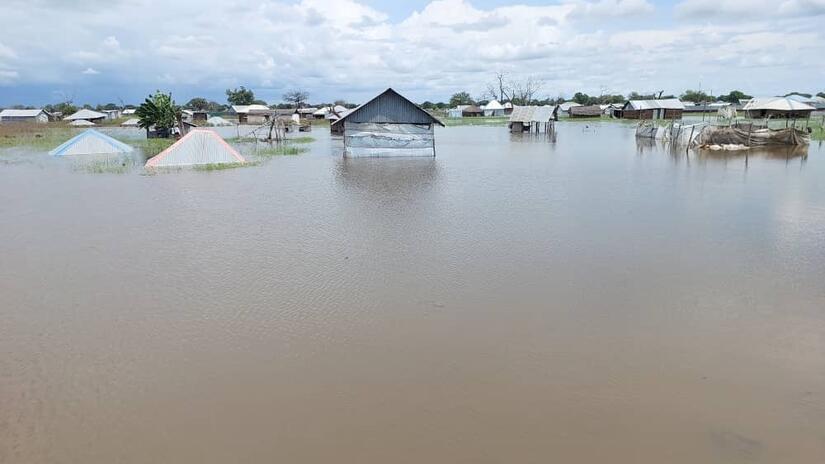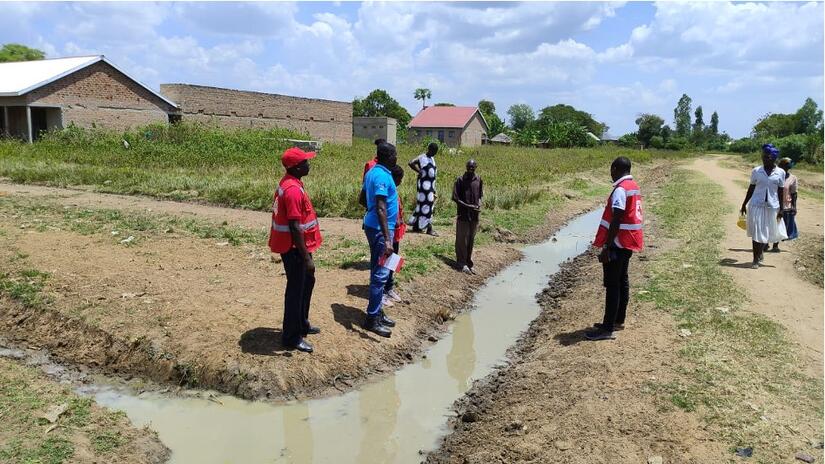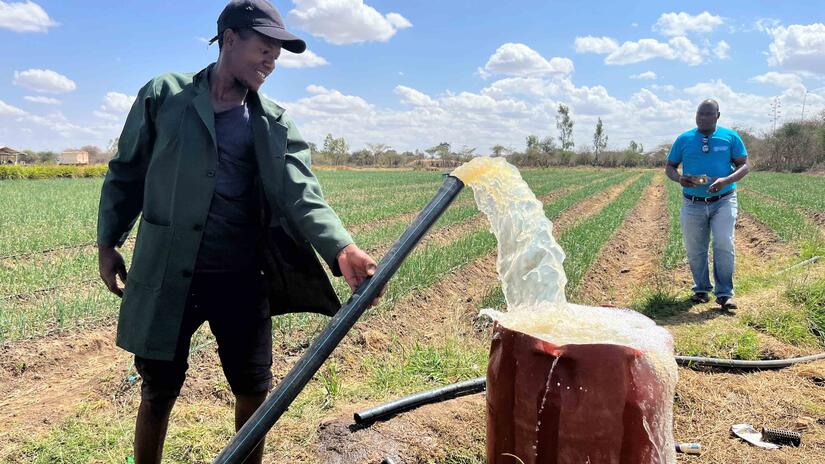Along the Niger River in Mali, Red Cross volunteers are helping local communities find new sources of water during dry spells when the river dries up and water for crops and livestock all but disappears.
“There is water in the river only for three months,” said Nouhoum Maiga, Secretary General of the Mali Red Cross. “And the people there, most of them, rely on that water for their cattle.”
As part of a pilot programme, volunteers help the communities dig wells and install solar-powered pumps that provide a continual source of water.
In addition, the Red Cross collaborates with meteorological and hydrological services to get ahead of future problems – extreme heat, unpredicted dry spells or flash floods – with community-based early warning systems.
As a result, says Maiga, local farmers have been able to quadruple their harvests. “Instead of just doing a harvest for one season they have been able to harvest four times,” he said.

Uganda Red Cross teams reach out to remote mountainside villages after a series of floods and mudslides.
Photo: Ugandan Red Cross Society
A complementary partnership
This is exactly the kind of forward-looking, multi-layered response to complex challenges that will be strengthened through a renewed partnership signed on 29 May, 2024 between the FAO and the IFRC.
The FAO and IFRC partnership aims to build on the two organizations’ complementary mandates and strengths at the local and international level in order to improve the quality, reach, impact and sustainability of food security and agricultural livelihoods programming. So far, the renewed partnership has been initiated in the Democratic Republic of the Congo, Ethiopia, Kenya, Mali, Nigeria, Niger, South Sudan and Uganda.
The partnership is born from a growing understanding that durable solutions to today’s complex and long-lasting humanitarian crises require ever deeper cooperation among multiple partners from the community to the global level.
“There is no such thing anymore as a simple disaster,” said Caroline Holt, the IFRC Director of Disasters, Climate, and Crises, speaking recently at an FAO-IFRC Global Dialogue on Localization held on 27 March, 2024 in Geneva, Switzerland . “Issues such as food insecurity are intimately connected to lack of access to safe water or reliable energy sources. All of these issues impact one another and so the solutions need to be equally integrated.”
Solutions to food insecurity must also address the complex factors that impact local food production and they will require new and innovative resourcing strategies. The partnership between the IFRC and FAO, therefore, will also serve as a base for wider investment by other partners interested in supporting local innovation on food security and livelihoods.

Houses in the town of Bor in Jonglei state, South Sudan, are covered in water following floods, one of many humanitarian challenges the South Sudan Red Cross has faced in recent years.
Photo: IFRC/SSRCS
“Two-thirds of people experiencing high levels of acute food insecurity depend on agriculture as their main source of livelihood, yet only four per cent of humanitarian assistance goes towards emergency agriculture assistance,” Dominique Burgeon, Director of the FAO Liaison Office in Geneva, noted during the FAO-IFRC Global Dialogue on Localization.
“Food aid alone is not enough to address acute food insecurity without the support and protection of livelihoods, many of which are based in local agriculture”.
Mali serves as a good example. In Mali, FAO and the Mali Red Cross are collaborating on cash transfers, supplies for farm and food production, and cooking demonstrations aimed at achieving good nutritional balance, among other things.
“We work with those communities, to empower them to be able to provide for themselves even in the midst of ongoing conflict,” added Maiga, who also participated in the FAO-IFRC Global Dialogue on Localization.
The case of Mali also highlights the critical role that IFRC member National Societies play in addressing complex, long-lasting crises. In Mali, the Red Cross works amid an array of challenges: unpredictable and extreme weather patterns exacerbated by climate change, instability and insecurity, loss of traditional livelihoods and food sources, and massive displacement of entire communities. Meanwhile, in many parts of the country, most international organizations have left due to a lack of security.
“The Red Cross has remained in the communities impacted by these crises ,” Maiga noted. “Why? Because the Red Cross is a community-based organization. Our 8,000 volunteers are part of the communities where they work.”

Teams from the FAO and the Uganda Red Cross survey work done to clean up canals from debris and other blockages that cause flooding in heavy rains.
Photo: Uganda Red Cross Society
The critical need for early action
Similar challenges exist in many countries. With one of the largest refugee populations in the world, Uganda is experiencing numerous, serious climate challenges, as weather patterns become more unpredictable. In some areas, entire communities have been washed away in flash floods.
In this case, collaboration between FAO and the Ugandan Red Cross has helped communities withstand heavy rains caused in part by the most recent El Niño Phenomena from September to December 2023.
With funding from FAO, the Ugandan Red Cross took actions in ten districts of Uganda in anticipation of coming rains: disseminating early warning information, mapping flood-prone areas, and overseeing cash-for-work activities in which local people cleaned water canals or removed silt from tanks that help contain excess water.
In other cases, the cash-for-work projects involved helping local communities safely manage crops to reduce loss once they have been harvested. Crops can be ruined if storage facilities are damaged by flooding or if the systems needed to store, transport and distribute them are disrupted.
“It's clear that the increasing frequency, magnitude, and intensity of disasters are not only affecting human lives, livelihoods and property but also evolve into epidemics requiring strong investment in community level preparedness and response,” said Ugandan Red Cross Secretary General Robert Kwesiga.

